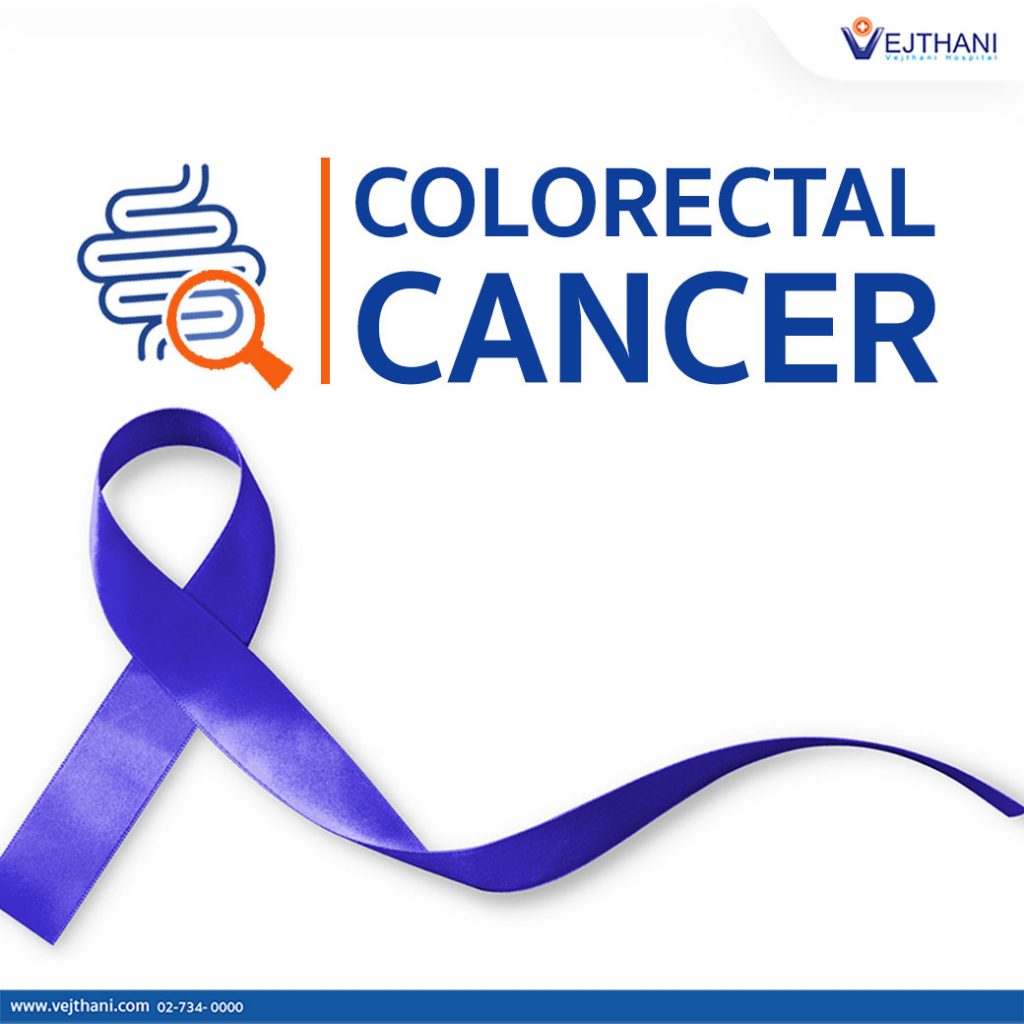August 6, 2024
Thailand’s Colon Cancer Treatment Specialists

You’ll receive the best colon cancer surgery and treatment in Thailand at Vejthani Hospital in Bangkok. Read on to learn about the differences between colon cancer and rectal cancer.
Although often lumped under the same generic name — colorectal cancer, it’s worth noting that colon cancer and rectal cancer aren’t the same. It’s essential to know the difference as that will affect your treatment options and prognosis. Both rectal and colon cancer affect the large intestine, but, crucially, they start in different places. Colon cancer begins anywhere along the colon (Large intestine), whereas rectal cancer starts in the rectum (i.e., the last 12 centimetres of the colon).
RISKS, SYMPTOMS & DIAGNOSIS
Typically, people with a family history of cancer, smokers, and those with obesity have a higher tendency to be diagnosed and need to seek treatment for colon cancer in Thailand.
Most colon and rectal cancer begins as a small growth in the bowel wall called colorectal adenoma. If left unchecked, colon cancer can grow into the muscle layers underneath and then through the bowel wall.
Many of the same symptoms can be attributed to both colon and rectal cancer. However, depending on the location of the tumor and whether or not it has metastasized, there will be significant differences.
Common Symptoms of colorectal cancer:
- Stomach pain or Bloating
- Constipation or diarrhea
- Narrow stools (Meaning irregular consistency of stool?)
- Blood in the stool
- Changes in bowel habits
- Black, dark, or red-colored stools
- General stomach discomfort
- General weakness and tiredness
- Unexplained anemia
Physicians typically use the same approach to diagnose both types of colorectal cancer; this could be an occult blood test, endoscopic exam, or colonoscopy. The most common initial course of action is a colonoscopy. In this procedure, a doctor uses a tube to see the inside of your colon and rectum. If they find areas that could be cancerous, the doctor will remove a small sample for a biopsy test.
Note: In terms of early prevention, small growths in the colon, called polyps, may need to be removed even if they are not yet cancerous.
TREATMENT
The first phase of treatment for colon cancer in Thailand is typically a partial colectomy, where a surgeon removes a section of the colon. If the surgery goes well, you will resume regular bowel movements. But this is not always the case. In such cases, you will require a colostomy, whereby the surgeon will connect the colon to a hole in your abdomen (ostomy). You’ll then have a colostomy bag attached to the ostomy to collect bowel movements. Furthermore, chemotherapy will be recommended if the cancer affects a particularly dense part of the colon where major blood vassels and adjacent organs are close by or has spread to the lymph nodes.
For rectal cancer, doctors will first opt for surgery if they believe they can successfully remove the entire tumor. This will often be performed in conjunction with chemotherapy and radiation therapy to shrink the tumor before surgery and after to kill-off any remaining abnormal cells. When a surgeon performs a rectal cancer operation, they will try to cut out all cancerous tissue without removing the anal sphincter (the muscle which controls bowel movements). However, in some cases, this is not possible because the tumor is too close to the muscle. In such instances, a colostomy will be required.
Colon and rectal cancer surgery and treatment in Bangkok can often be prevented with regular screenings, lifestyle and diet modifications. As the saying goes, “An ounce of prevention is better than a pound of cure.” But if you do find yourself requiring colon or rectal cancer surgery in Bangkok, make sure you make the expert specialists at Vejthani Hospital your first stop.
To make an appointment, please contact Cancer Center, at the main building, 3 rd Fl., Vejthani Hospital or call +66(0)85-223-8888 (English Hotline).
August 1, 2024
Breast Cancer: Symptoms, Risk Factors and Detection
July 25, 2024



Call Us
Hi! How can we help you?